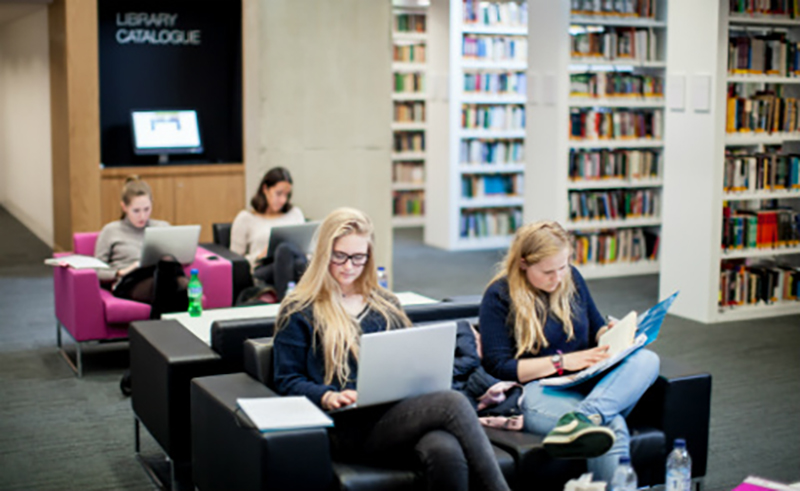As well as all the core facilities you’d expect on a 21st-century university campus, Oxford Brookes is home to some unique resources. Explore special collections and archives tailored for academic research, discover state-of-the-art facilities designed for specific subject areas, and immerse yourself in our dedicated exhibition space. We go beyond the ordinary, providing a rich tapestry of resources to enhance your academic journey.
Great facilities on campus
As you would expect, whichever subject you study, you’ll have access to excellent specialist facilities, from well-equipped laboratories and engineering workshops, to cutting edge healthcare facilities, performance and exhibition spaces. Here are a few highlights:
- A new cognitive robotics lab - home to four interactive robots: Artie, a life-sized, multilingual, fully interactive Robothespian; Baxter, a humanoid robot with cameras on the end of each arm so he can recognise, pick up and manipulate objects; and the Nao twin robots who are 23 inches tall but capable of walking, recognising faces and voices, and detecting objects.
- Babylab - used by psychology researchers to carry out research into how babies learn language. Facilities include an eyetracker - a special camera that uses infra-red light to create a reflection on the baby’s eye, which measures the length of time they focus on images.
- A purpose-built engineering centre including specialist workshops, an automotive engineering lab with a four-post test rig, and a state-of-the-art lab including four engine test cells, and a suite of software for statistical and data analysis.
- A sports lab accredited by BASES (the British Association of Sport and Exercise Sciences).
- A life-sized family of manikins and simulation suites form part of specialist healthcare facilities.
- An exhibition space, the Glass Tank, used to showcase the work of students and staff across a range of disciplines, as well as professional artists.
- Cutting-edge digital media facilities including a green screen room, motion capture studio and TV studio from which our award-winning student television station BrookesTV is broadcasted.
- The refurbished biology laboratories house the University’s bio-imaging unit, advanced confocal, light and electron microscopes, and lots of other specialist equipment in modern purpose-built research labs.
- An in-house mooting court (mock court room) providing the School of Law and Social Sciences with a place for students to develop their advocacy skills.
- A new Bloomberg Trading Suite open to Accounting, Finance and Economics students. Students have access to real-world financial market data on the Bloomberg electronic trading platform as part of their learning, preparing them for their first steps into the industry. The students are able to make mock transactions, with a focus on sustainable finance and ethical trading that has social and environmental benefits.
- A new Marketing and Social Media Lab open to all students in the Business School. Students can learn and collaborate on real-world industry tools like BrandWatch and Adobe Creative Suite, and learn how to launch and monitor a digital marketing campaign.
Oxford Brookes' central library on Headington Campus is home to some fascinating special collections – a huge range of archive materials to enrich your learning, spanning publishing, arts, architecture, medical sciences, food and drink.
- Booker Prize Archive
- Andre Deutsch Collection
- Early Children’s Book Collection
- Medical Sciences Archive
- Jane Grigson Collection
- Fuller Collection.

Oxford Brookes hosts special collections including the Booker Prize Archive. Consisting of hundreds of letters, administrative details, publicity material, photographs and short and long lists, along with literary works from the likes of Doris Lessing, William Golding, Salman Rushdie and Hilary Mantel, the material goes back to 1968 when the prize was set up. The archive illuminates many issues, like the history of 20th century publishing, the move from hardback to paperback, and how shortlisted books reflect changing debates in society - making it of interest to academics across many subjects including English Literature and Sociology, as well as students, journalists and other researchers.
As part of some teaching sessions, students explore collections, identify research themes, and then share their findings with the wider group. This hands-on approach is a great way to discover the scope of these collections and the additional insights that primary sources can bring to their research. Students become experts in their chosen areas, with the exciting potential of discovering something previously unknown.

As a postgraduate student, you will have access to a library network spread across all campuses housing around half a million books, an extensive collection of online resources, as well as DVDs, journals and databases. There are spaces for silent study, bookable group rooms, PCs, free laptop hire, and full Wifi coverage. Academic liaison librarians can help you access resources for your course, and you can manage your library account from your phone.
“The opportunity to leaf through countless boxes of letters, papers and correspondence can’t be duplicated in a digital, online world.”
Mark Jones, MA in Book History and Publishing Culture
